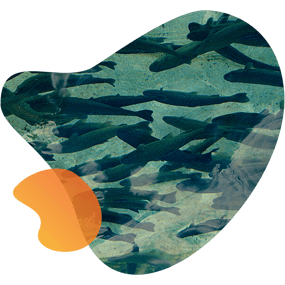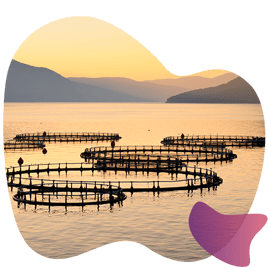Originally published : Mon, June 7, 2021 @ 5:48 PM

Updated : Wed, December 14, 2022 @ 1:44 PM
The global demand for fish and fish products continues to increase as consumers focus on health-conscious ways to add protein to their diets. Aquaculture, the cultivation of freshwater and saltwater fish under controlled conditions, expands the availability of fish to geographies that may otherwise have limited or no access to the cultured species. Globally, since 2016, aquaculture has been the primary source of fish available for human consumption.1 In fact, according to the Food and Agriculture Organization of the United Nations, there was a 527% increase in global aquaculture production from 1990 to 2018.1
Supporting increasing demand with aquaculture breeding programmes
To meet the growing demand for fish and fish products, aquaculture breeding programmes focus on producing high-quality products that the market desires. Traits including growth rates, feed conversion efficiency, disease resistance, low oxygen tolerance, stress tolerance, processing yields, sexual maturation time, body conformation and colour are of interest to aquaculture breeders. Modern aquaculture programmes implement genomic technologies to make favourable selections for specific traits of interest. Because the domestication of aquaculture species is relatively recent compared to livestock and plants, there is a tremendous potential for genetic gain using advanced genomic technologies.
SNP markers help increase genetic gain
Highly efficient genotyping platforms, including single nucleotide polymorphisms (SNPs), allow for mapping trait markers across an entire genome. SNPs are important tools for identifying broodstocks, traits and strains in aquaculture. SNP technology helps identify candidate genes of traits and quantitative trait loci (QTL) useful in aquaculture.2 QTL are genomic regions associated with phenotypic variation for a specific trait, such as growth, skin pigmentation, body shape, meat colour, age of maturity, thermal tolerance, lipid metabolism, stress resistance and disease resistance. Because most aquaculture traits are complex and are likely controlled by multiple genes, QTL mapping is the foundation of aquaculture genomics.3 Several dozen aquaculture species have undergone QTL analyses to help breeders understand the multi-gene influence on specific traits of interest.
SNP markers offer a fast, cost-effective way for aquaculture researchers to evaluate breeding families to identify siblings that carry the alleles associated with high-performance traits. It’s estimated that SNP technology can increase selection accuracy and genetic gain, on average 25%.4 One promising development in SNP marker evaluation is a technique called imputation. In imputation, lower-cost, low-density SNP panels that search for fewer genetic changes are combined with several higher-cost panels that probe the genome in more detail.4 This technique allows breeders to cost-effectively screen a large number of samples to identify those that are best suited for their breeding programmes.
Case studies using genomic tools to advance aquaculture breeding programmes
Large and small aquaculture companies are implementing genomic technology to increase genetic gain for specific traits of interest. Here are a few examples that demonstrate the impact of this technology on breeding programmes.
Applying tailor-made genomic tools in a commercial Atlantic salmon breeding programme

In 2014, Cooke Aquaculture Incorporated (CAI), a vertically integrated aquaculture corporation based in Blacks Harbour, New Brunswick, Canada, initiated a 3-year project to develop advanced genomics tools to apply in its Atlantic salmon breeding programme. As part of the project, both high-density and low-density SNP panels were introduced to select for growth improvement, analyse parentage and confirm continent of origin assignment for its fish. SeqSNP™ technology by LGC, Biosearch Technologies™, which allows cost-effective targeted genotyping by sequencing markers, allowed CAI breeders to screen and evaluate more broodstock candidates for their commercial egg production line, resulting in greater breeding success.5 The breeding team at Cooke Aquaculture found the SeqSNP technology to be flexible for their needs, while also offering the possibility for future implementation of marker-assisted selection.
Using imputation to improve breeding outcomes in Atlantic salmon and tilapia
Dr Jose Manual Yanez, Director of R&D and Faculty at the University of Chile, researches the genomic capabilities in aquaculture breeding programmes. He and his team successfully used low-density SNP panels (from 0.5 to 6K) to accurately impute to higher density genotypes (50K) in breeding programmes for Atlantic salmon and tilapia.5 Through their research, Yanez’s team concluded that genomic selection accelerates the genetic progress for disease resistance and other important traits in aquaculture species. They have also found that imputation from low-density SNP panels to high-density genotypes decreases the costs of genomic selection in aquaculture while maintaining data integrity.
Designing an on-site genotyping lab to advance a shrimp breeding programme
 American Penaeid, the largest shrimp farming company in the U.S., built an on-site high-throughput, scalable SNP genotyping system to support their breeding efforts. They use KASP™ genotyping chemistry by LGC, Biosearch Technologies to manage their germplasm, conduct quality control, and identify trait-associated markers. In less than two years, the breeding team has been able to genotype 500,000 unique animals to produce shrimp with improved survival rates and favourable growth characteristics. KASP genotyping has been ideal for this on-site lab because it is off-the-shelf, fast, easy to analyse, tolerant of sample variation, and, most importantly, cost-effective.
American Penaeid, the largest shrimp farming company in the U.S., built an on-site high-throughput, scalable SNP genotyping system to support their breeding efforts. They use KASP™ genotyping chemistry by LGC, Biosearch Technologies to manage their germplasm, conduct quality control, and identify trait-associated markers. In less than two years, the breeding team has been able to genotype 500,000 unique animals to produce shrimp with improved survival rates and favourable growth characteristics. KASP genotyping has been ideal for this on-site lab because it is off-the-shelf, fast, easy to analyse, tolerant of sample variation, and, most importantly, cost-effective.
It’s easy to see that genomic tools are critical for improving the efficiency and sustainability of aquaculture production, which is projected to reach 109 million tonnes in 2030 (an increase of 32 per cent over 2018).1 It’s estimated that less than 10 percent of current aquaculture production is based on genetically improved stocks, due in part to the associated cost of implementation.3 Cost-effective genotyping methods, including KASP and SeqSNP, are critical tools to support the growing demand for sustainable aquaculture production. To learn more about the case studies referenced above, watch our webinar, Application of advanced genomic tools in aquaculture breeding programmes.
References
- Food and Agriculture Organization of the United Nations. The state of world fisheries and aquaculture 2020. Online. Published 2020. Accessed April 28, 2021. http://www.fao.org/state-of-fisheries-aquaculture
- Wenne R. Single nucleotide polymorphism markers with applications in aquaculture and assessment of its impact on natural populations. Aquat. Living Resour. 31, 2. Published 2018. Accessed April 28, 2021. https://www.alr-journal.org/articles/alr/full_html/2018/01/alr170040/alr170040.html
- Food and Agriculture Organization of the United Nations. Genome-based biotechnologies in aquaculture. Accessed April 28, 2021. http://www.fao.org/3/bt490e/bt490e.pdf
- Stokstad E. New genetic tools will deliver improved farmed fish, oysters, and shrimp. Science. Published November 19, 2020. Accessed April 28, 2021. https://www.sciencemag.org/news/2020/11/new-genetic-tools-will-deliver-improved-farmed-fish-oysters-and-shrimp-here-s-what
- LGC, Biosearch Technologies. Application of advanced genomics tools in aquaculture breeding programmes. Webinar. Published 2021. Accessed April 27, 2021. https://www.biosearchtech.com/support/webinars/application-of-advanced-genomics-tools-in-aquaculture-breeding-programs




